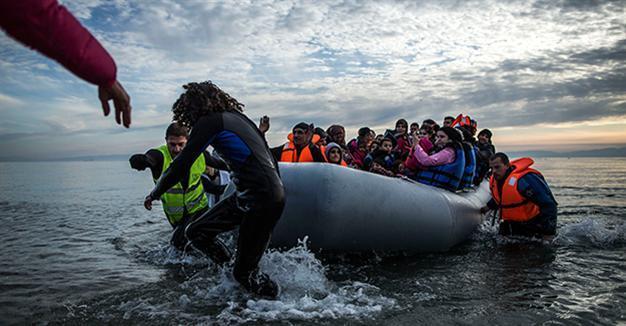EU-Turkey deal ‘may break migrant trafficking chain in 10 days’
Murat Yetkin - ISTANBUL

Refugees and migrants are helped by volunteers on their arrival aboard a dinghy at Mytilene on the northeastern Greek island of Lesbos, Tuesday, Feb. 23, 2016. AP Photo
The migrant trafficking chain into the EU between Turkey and Greece could be broken within “10 days at most” if a final deal can be reached between Ankara and Brussels, a ranking government official told the Hürriyet Daily News on March 11.The official, who is closely involved in the issue but asked not to be named, said that once the political framework is settled with the EU it would be possible for the Turkish and Greek government to establish a “legal framework” that could “break the chain of migrant trafficking” in a short period of time.
Underlining that the Turkey-EU meeting in Brussels scheduled for March 18 was of key importance, the official described the possible mechanism between Turkey and Greece to stop the illegal migrant flow across the Aegean Sea as follows:
- The entire process has to work on a strong legal basis. That would mean an implementation agreement between Turkey and Greece after a deal is reached between Ankara and Brussels. “We think the EU might have some counter proposals and we are ready to discuss these for the sake of an agreement that could take pressure off the shoulders of Turkey, Greece and the EU as soon as possible. We don’t want the Aegean Sea to be mentioned with the deaths of unfortunate Syrian or other migrants in the hands of human traffickers. The NATO patrol in the Aegean, in which both Turkish and Greek navies are taking part, is proof of this wish,” the official said.
* Once a deal with the EU is reached, Ankara wants to propose taking back all migrants who leave Turkey for a Greek islands - regardless of their nationality, Syrian or otherwise. “This needs the full cooperation of the Turkish and Greek immigration agencies on the Turkish coast and on the Greek islands. If agreed, we will take all refugees, put them on ferries, treat them well with food, tea and coffee, and them take back to the Turkish coast. The EU will pay the cost of this operation,” the source said.
* A different procedure would be applied for Syrians, owing to the situation of war across the border. “As we cannot send the refugees back to civil war-hit Syria, some of them could stay in the camps and some of them could stay with their relatives in Turkey, all in cooperation with the [United Nations Refugees High Commission] UNHCR. Regarding those from other countries – such as Afghanistan, Somalia, or any other place - we will apply U.N. deportation principles, put them onboard planes and send back to their own countries,” the official stated.
* He also cited one key condition for this process to go into effect: No migrants should be left on designated Greek islands before Turkey starts taking migrants back. “We believe that if can implement this plan then we can break the chain of migrant trafficking across the Aegean into the EU within a week or at most 10 days. Once it is heard that all migrants smuggled to Greece are sent back to Turkey and they cannot reach the EU, the route will lose all its attraction and control will be secured much more easily,” the official said.
In this week’s meeting between Turkey and EU leaders in Brussels on March 7, Prime Minister Ahmet Davutoğlu presented a new proposal to stop illegal migration from war-torn Syria and other countries, including the sharing of all migrants who used the Aegean-Balkan route in order to double the 3 billion euro fund, reactivating EU membership negotiations with Turkey, and securing free travel for Turkish citizens within Schengen states.
The next meeting is scheduled for March 18, as part of the EU Council meeting.











